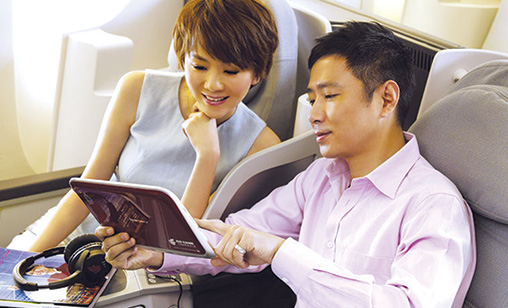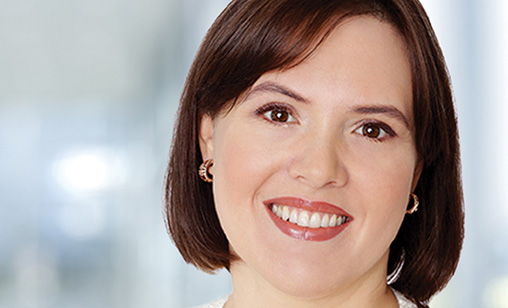Industry Insight Special Report
What a passenger must have — now
What do airline passengers expect when they embark on their airline journeys? Simple. They dream of hassle-free travel from their departure airport to the flight and onto their destination. Along the way they demand their experiences at 35,000 feet mirror their lives on the ground.
February 1st 2019
We take WiFi availability for granted on the ground. In the air, some airlines offer it. Many do not - and they are penny pinching to their detriment. Survey upon survey reveals WiFi on board is critical to attracting and retaining customers. Read More »
Global mobile communications provider, Inmarsat Aviation, recently reported demand for WiFi service on flights was so critical to a passenger’s flying experience that they were prepared to sacrifice alcoholic drinks and meals in exchange for guaranteed WiFi service to their seat.
 |
More than three quarters of those polled (78%) in a global Inflight Connectivity Survey said Wi-Fi is “fundamental” to daily life and more than half (55%) of respondents said the service was crucial to their travel experience.
Premium passengers, parents and younger passengers are among those most likely to use inflight Wi-Fi service. “Whether it’s used for sending that important work email, entertaining the children or connecting with fellow passengers, staying online is a crucial part of the inflight experience for today’s airline passengers,” said Inmarsat Aviation president, Philip Balaam.
Demand for inflight WiFi outstrips supply. Passengers can send emails, search the Internet and more on some flights, but access is “spotty” from airline to airline. Less than half of global passengers (45%) have travelled on flights offering the service, the Inmarsat survey found.
Inmarsat said the survey led it to conclude that inflight WiFi is a key driver in developing airline customer satisfaction and loyalty. More than two-thirds of all passengers (67%) are more likely to rebook with an airline if quality inflight Wi-Fi is available. The breakdown is 83% for business travellers and 81% for passengers travelling with children.
 |
“In the digital age, consumers feel more empowered,” said Sabre Airline Solutions vice president and general manager Asia-Pacific, Dasha Kuksenko. “With the advent of mobile devices, consumers can accomplish tasks with just a few taps and are increasingly expecting more from the brands with which they interact.
“Studies reveal that 69% of customers are more loyal to companies that personalise their experiences, which is especially true for millennials who are known to value experiences over material goods.
“As consumer trends continue to evolve, airlines can adopt strategies to deliver next generation customer experiences by taking charge of the potential passengers from the commencement of their journeys to boarding and the flight itself.”
The Asia-Pacific is forecast to handle four billion passengers, more than half of the world’s passenger traffic, by 2036. “Smart use of technology can help manage the challenges of rising passenger numbers, limited infrastructure and increased complexity, said digital analytics and solutions provider, SITA.
“Biometrics is becoming more commonplace at airports worldwide. SITA is working with around 40 governments to providing border management solutions. We also have biometric self-service solutions operating worldwide, including Australia, USA, Mexico and the Middle East,” SITA said.
Seamless travel required turning traditional methods on their heads. Airlines must “unlearn” the methods that made the industry a success in the past, said IATA’s FDS Transformation Director, Eric Leopold.
Speaking at IATA’s recent Global Media Day, he said not all airlines will move at the same pace in the digital revolution, but they understand it cannot be avoided. Seamless shopping experiences corroborated this trend as customers expect real-time information and zero click payments as the standard for digital purchases, he said.
Enhanced processes such as automation, new distribution and payment capabilities and business model changes are “transformation horizons” that should be under consideration for carriers, he said. IATA is working on a range of initiatives, including ONE Order (ticketing processes) and ONE ID (check-in processes), to redefine the passenger experience. Both are vital components in the quest to offer a seamless journey for customers.
Airlines must look at other industries to be abreast of trends. Messaging Apps, for example, are having a huge impact on the hotel business. In terms of mobile booking rates for hotels, Asia is far ahead of the rest of the world.
China’s WeChat holds 86.7% of domestic market share for messaging apps and it was only launched in 2011. KakaoTalk in South Korea dominates the local market where 99.2%, or 99 million users, are KaKaoTalk subscribers. In China, 60% of online bookings are made by smartphone. In North America it is 28% and Europe 33%.
Despite the abundance of surveys that promote Wi-Fi on board it rates as number four in passenger priorities. More important is the airline’s reputation (1), free checked baggage (2) and extra leg room (3). Other key “wants” of air travellers, some of them admittedly unrealistic, are: • No queues at check-in • Efficient and rapid immigration processes on departure and arrival • Seamless passage through security and standardization of security requirements across the world • Real time baggage tracking • Mobile connectivity with real time information from their airline about delays, gate changes and other factors that affect their journeys. |
Another messaging app is LINE, with nearly 200 million active users per month in Japan, Taiwan and Thailand. It is expanding in Hong Kong and Singapore. Such high traffic sites offer huge opportunities for airlines to reach new customers.
SITA’s 2018 Air Transport IT said: “Self-service continues to reduce passenger processing times at airports. Passenger processing at off-airport locations is another element in the tech-savvy airport’s toolkit. By 2021, 46% plan to have off-airport services,”
Almost 90% of airports have check-in kiosks and they are forecast to be integral to the operations of all airlines by 2022. Self-service for baggage processing is becoming more common with 78% of airlines intending to put in place unassisted bag drop systems in the short to medium term.
In the next three years, 77% of airports are planning major programs or R&D in biometric ID management, with overall airport IT spend expected to reach far beyond the $10 billion of the last 12 months.
SITA boss, Barbara Dalibard, said: “As the research shows, integration causes challenges and the variety of legislative demands can be daunting for airlines and airports. To deliver a seamless passenger experience, we must all collaborate – airlines, airports, governments and industry suppliers – and use technology to automate and even eliminate tedious processes. We achieve the best results when we work together.”
IATA’s Head of Passenger Security, Guido Peetermans, said the global airline association’s strategy is to open borders and improve passenger processing efficiency. It is encouraging countries to use data from its interactive API (Advanced Passenger Information) systems to replace traditional visas with e-Visas.
It also wants to promote automated border control (ABC) systems that read ePassports and advocates IATA’s Fast Travel practices of more self-service, automation and advanced screening, self-check-in, bag drop, immigration and self-boarding.
For passengers, lots of entertainment on board is a must, particularly for long-haul journeys. Carriers in the region and Gulf airlines have well-earned reputations for providing top class IFE to their passengers, especially as their systems are continually upgraded.
An example was an Emirates Airline announcement in January that it will upgrade the Emirates mobile App to allow passengers to create their own playlists ahead of their flights and sync it to their seats after boarding. Flyers can choose the music, movies or TV shows they want to enjoy during a flight.
| Qantas passengers submit bucket lists for ultra-long flights With Qantas “Sunrise” ultra-long haul flights from Sydney to London and New York on the drawing board for launch in 2022, the Australian carrier asked its customers for their bucket lists of services they would like available on the 22-hour journeys. They included: * Sense of separation: virtual reality relaxation zones, audio mindfulness experiences and broader inflight entertainment * Spaces to do stretching and gentle exercising * Dedicated exercise zones that included exercise bikes and rowers * Refresh stations that offered cold drinks and snacks * An inflight café that served both alcoholic and non-alcoholic drinks, snacks and “treat” foods. |